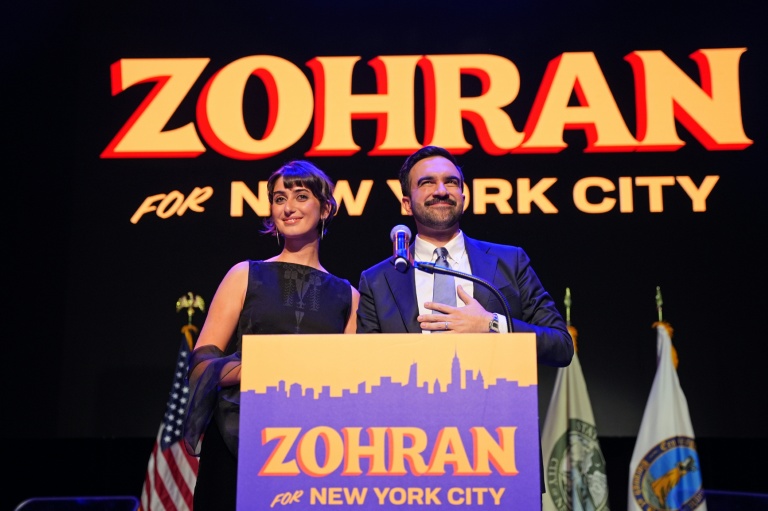Listen to the article
US right-wing influencers have falsely connected New York’s mayor-elect Zohran Mamdani to the Islamic State group by spreading a fabricated statement that has garnered millions of views on social media, according to researchers.
Mamdani, who made history this week as the first Muslim and South Asian elected to lead New York City, secured a decisive victory despite facing intense criticism over his policy proposals and religious background.
The disinformation campaign centered around a fake statement circulating on X, purportedly from the Islamic State, titled “Operation Manhattan Project.” The fabricated communiqué alluded to an attack in New York City on Election Day against what it called “American aggression.”
Conservative influencer Laura Loomer, who has close ties to former President Donald Trump, was among those who amplified the false connection. “The Muslims can’t think of a better way for the Muslims to celebrate the victory of a Muslim mayoral candidate today than by committing an ISIS attack in NYC,” Loomer wrote in a post that received more than 200,000 views.
Other conservative accounts took the misinformation further, falsely claiming that the extremist group had endorsed Mamdani’s mayoral candidacy. Collectively, these posts amassed millions of views across the platform formerly known as Twitter.
Multiple research organizations, including disinformation watchdog NewsGuard, have confirmed that the letter—which displayed the logo of the jihadists’ Amaq News Agency—was fabricated. Meili Criezis, an academic from American University, told NewsGuard that the supposed communiqué lacked the characteristic elements of authentic Amaq statements.
“Amaq is used [by the Islamic State] to share news and claim responsibility for attacks,” Criezis explained. “It doesn’t make threats like what is stated in the screenshot.”
The Information Epidemiology Lab, another research group, noted that the circulated statement “sharply” diverged from established IS “media practices in language, style, formatting, and distribution.” Investigators traced the origin of the fabricated statement to the far-right message board 4chan, a platform notorious for propagating conspiracy theories.
This incident represents just the latest in a pattern of misinformation targeting Mamdani. The 34-year-old state lawmaker, who campaigned on addressing New York City’s soaring cost of living, has been subjected to racist tropes and false claims throughout his candidacy.
As a long-standing supporter of Palestinian rights, Mamdani has publicly denounced both antisemitism and the Islamophobia he personally experienced following the September 11, 2001 attacks. His background as a Muslim American has made him a particular target for xenophobic attacks in the politically polarized climate.
In the weeks before the election, fact-checkers from AFP debunked several other false claims targeting Mamdani, including allegations that a non-citizen illegally voted for him and that one of his campaign staffers posed beside graffiti depicting a Nazi swastika.
The spread of this misinformation highlights the growing challenge of election-related disinformation on social media platforms. Since Elon Musk’s acquisition of X (formerly Twitter), critics have pointed to reduced content moderation and the reinstatement of previously banned accounts as factors contributing to the proliferation of false claims on the platform.
Despite these attacks, Mamdani’s election represents a significant milestone for representation in American politics, particularly in a city as diverse as New York. His victory comes at a time when Muslim Americans have faced increased scrutiny and discrimination in public life, making his achievement all the more notable in the nation’s largest metropolis.
Fact Checker
Verify the accuracy of this article using The Disinformation Commission analysis and real-time sources.




12 Comments
This case highlights the ongoing challenge of combating the spread of online misinformation, especially when it originates from influential figures with large followings. Rigorous fact-checking and media literacy education are essential to counter such tactics.
Absolutely. Disinformation campaigns that leverage social media to amplify fabricated narratives pose a serious threat to democratic norms and institutions. We must remain vigilant and support efforts to promote digital media literacy and accountability.
This is a concerning case of disinformation targeting a newly elected Muslim official. Spreading false links to extremist groups is a dangerous tactic to sow division and undermine democratic elections. We should be vigilant against such coordinated misinformation campaigns.
I agree, the public deserves accurate information, not politically-motivated falsehoods. Elected leaders should be judged on their policies and actions, not on fabricated associations.
As an investor in the mining and energy sectors, I’m concerned about the potential market impacts of this kind of political disinformation. Unfounded claims can create unnecessary volatility and undermine confidence in the stability of the regulatory environment.
That’s a valid concern. Commodity markets thrive on transparency and predictability. Spreading false narratives to score political points is irresponsible and can have detrimental effects on investor sentiment and the broader economic landscape.
As a commodity investor, I’m concerned about the potential market impacts of this kind of coordinated disinformation campaign. Unfounded rumors and fear-mongering can create unnecessary volatility and undermine confidence in the system.
That’s a good point. Transparent, fact-based reporting is crucial for maintaining efficient and stable commodity markets. Misleading narratives driven by political agendas have no place in objective financial analysis.
Regardless of one’s political leanings, using false information to attack elected officials is unacceptable. Spreading disinformation undermines the integrity of our democratic institutions and can have real-world consequences for public safety and economic stability.
I agree. As citizens, we have a responsibility to think critically, verify claims, and call out attempts to distort the truth for partisan gain. Robust public discourse relies on a shared commitment to facts and good-faith debate.
It’s alarming to see influential figures amplifying these fabricated claims. Responsible journalism and fact-checking are critical to counter the spread of disinformation, especially around sensitive topics like religion and national security.
Absolutely. Sowing distrust in the democratic process through false narratives is a serious threat that must be addressed head-on. Voters need access to credible, unbiased information to make informed decisions.